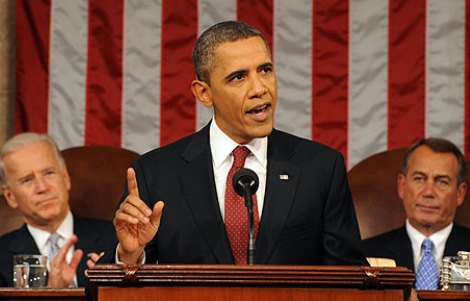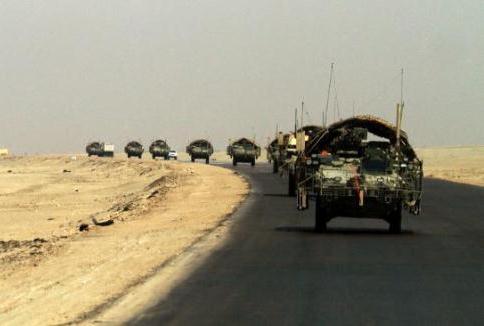The President stated time and again the need for American people to work together in harmony. Only by unity, he stressed, will the United States be able to overcome the severe economic crisis it is facing. However, the arguments he made and the tone of his speech do not seem to reflect his own willingness to adopt this trend of unity. Throughout his speech he made frequent comments of a controversial nature against his political rivals. The most apparent one was his tacit accusation of the previous admini stration for the creation the economic crisis. His message was clear, though it was not said that explicitly: since the crisis began during President Bush's tenure, he, Obama, should not be blamed for it.
stration for the creation the economic crisis. His message was clear, though it was not said that explicitly: since the crisis began during President Bush's tenure, he, Obama, should not be blamed for it.
The President stressed that since he came to office most of his energies and attention were devoted to the resolution of the crisis. Here again he could not refrain from allegations against his political rivals. Notwithstanding the opposition he faced from his political adversaries, the President stressed, he managed to gain some important success in resolving the crisis. Obama stressed that he was determined to struggle against the "obstruction" placed by his political rivals. Obama's message in this regard was clear: facing this severe crisis, all the conflicting groups within America should lay aside their controversies. They should devote their energies towards the achievement of the common goal: the resolution of the crisis. The United States army unites, he stated, have operated this way in recent years, and thus they have been so successful in their mission.
The withdrawal of United States troops from Iraq
The President went out of his way in his efforts to praise his decision to move United States troops from Iraq. Being aware of the great support for this decision within the United States public, the President stressed that this is the first time after nine years that there are no American troops in Iraq. A similar process, he stated, also began in Afghanistan. Over ten thousand troops have already left to return home. Another twenty three thousand troops will return home during this coming summer.
In reality, it should be stressed, the withdrawal of United States troops from Iraq occurred before the United States assured the ongoing survival of Iraq as a viable, stable, sovereign state whose territorial integrity is ascertained. It is already clear that the two states bordering Iraq – Iran in the south and Turkey – are trying to get their share in this devastated country. According to some information, Turkey and Iran already have a de facto control over the northern and southern parts of the country. At the same time the central government is struggling against intensive efforts to carry out terror operations inside Iraq's main cities. This is not the way the United States wanted to see Iraq after its withdrawal.
Regarding the "Arab spring," the President stressed the "huge stake" the United States has in the "Arab spring" and its results. Although " it is ultimately up to the people of the region to decide their fate", the President stressed, the United States would stand against trends of "violence and intimidation" and in support for "the rights and dignity of all human beings." It will also support the establishment of stable democracies in that area.
The President refrained from explaining the practical meaning of his words. It seems that at this stage the United States is well aware of its limited power in the region. The ongoing terrible atrocious within Syria in which hundreds of people are killed almost on a daily basis clearly expose the United States weakness and lack of determination at this period of time. The President is smart enough to refrain from making pledges he cannot fulfill.
Among the leaders who stepped down from the stage in light of the "Arab spring," the President chose to highlight the ruler of Libya, Qaddafi, who has "American blood" on his hands. The President certainly knows that the removal of Qaddafi from office enjoyed wide support in Western public opinion in general and American public opinion in particular. The President chose to overlook President Mubarak. Obama administration's conduct towards President Mubarak was widely criticized all over the international community and in the Arab world in particular. Many claimed this reflected a forsaking of an American ally when he was caught in a severe crisis.
Above all the "Arab spring" has demonstrated how wrong was the Obama administration thinking that the Arab-Israeli conflict in general, and the Israeli-Palestinian conflict, in particular, are the primary source of instability in the Middle East. Thus, it was argued, once those conflicts would be resolved, peace and tranquility would come to the region. The "Arab spring" made it clear that the reasons for the lack of stability in the Middle East are deeper and go far beyond the Arabs' conflict with the State of Israel. The lack of hostile statements towards Israel in Syria, which has been considered the most hostile state towards Israel, clearly proves this.
Iran
Regarding Iran and its nuclear project, the President stressed his success in uniting the international community in a joint action against Iran. He went as far as stating that the world which was divided on the question of Iran "now stands as one." The Iranian regime according to the president is isolated more than ever before. The sanctions against Iran will continue until the Iranian leadership would respond positively to the demands of the international community. The President stressed that there should be no doubt about the United States determination to prevent the nuclearization of Iran. The United States certainly prefers this to be achieved by peaceful means. However, if those means fail to stop Iran's drive to nuclear capability, then the Iran must know that "all the options are on the table."
Obama's statements regarding Iran are not new. Similar statements were made frequently before. Until now they seem to have failed to convince Iran to eliminate its nuclear project. Indeed the new sanctions seem to be much more serious than before. However, their effectiveness would be determined by Iran's behavior. Within a few months we will know if Iran is deterred or not by the new measures undertaken against it by the international community. The recent visit of Iranian leaders in the nuclear facilities and their provocative statements and threats indicate that Iran is far from being deterred by those punitive measures.
United States status in the world
The President believes that under his leadership the United States is "safer and more respected" in the world. The President does not agree with the claims that the United States position in the world has weakened in recent years. Though the United States does not control every event in the world, it remains the most "indispensible nation in world affairs." Here again, the President's statement seem to reflect more justified aspirations than realities on the ground. The stalemate in the Israeli Palestinian peace process, the ongoing turmoil in Syria accompanied by the daily killing of innocent citizens, the provocative measures of Iran and North Korea and other disturbing events clearly reflect the thinning power of the United States in world affairs.
* Prof. Zaki Shalom is a senior researcher at the Ben-Gurion Research Institute, Ben-Gurion University and a senior research fellow at the Institute for National Security studies.
